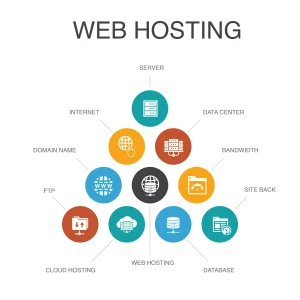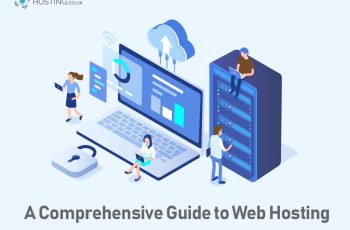In the vast landscape of the internet, web hosting serves as the bedrock for establishing an online presence. Whether you’re an individual blogger, a small business, or a large enterprise, selecting the right hosting service is a critical decision that can significantly impact the performance, security, and scalability of your website. This article aims to provide a comprehensive guide to web hosting, exploring its types, key features, and factors to consider when choosing a hosting provider.
Understanding the Basics of Web Hosting
At its core, web hosting is a service that allows individuals and organizations to make their websites accessible on the internet. When you create a website, its files, images, and content need to be stored on a server—a specialized computer designed for hosting websites. Web hosting providers offer the infrastructure and services required to store and manage these files, ensuring that your website is accessible to users around the world.
Types of Web Hosting
Shared Hosting: Economical and Beginner-Friendly
Shared Hosting Overview
Shared hosting is a common entry point for individuals and small businesses entering the online space. In a shared hosting environment, multiple websites share resources on the same server. This sharing model makes shared hosting an economical option, but it comes with certain limitations.
Pros of Shared Hosting
- Cost-Effective: Shared hosting plans are typically more affordable, making them an attractive option for budget-conscious users.
- Ease of Use: Shared hosting is often designed with beginners in mind, offering user-friendly interfaces and simplified management.
Cons of Shared Hosting
- Resource Limitations: Since resources are shared among multiple websites, high traffic on one site can impact the performance of others.
- Limited Customization: Users have limited control over server configurations and may be restricted in installing certain software.
Virtual Private Server (VPS) Hosting: Enhanced Control and Performance
VPS Hosting Overview
Virtual Private Server (VPS) hosting bridges the gap between shared hosting and dedicated hosting. In a VPS environment, a physical server is divided into multiple virtual servers, each with its dedicated resources and operating system. This configuration provides users with more control and improved performance compared to shared hosting.
Pros of VPS Hosting
- Increased Performance: With dedicated resources, VPS hosting offers better performance and responsiveness for websites with moderate traffic.
- Customization Options: Users have more control over server configurations and can install custom software.
Cons of VPS Hosting
- Cost: While more affordable than dedicated hosting, VPS hosting is generally pricier than shared hosting.
- Technical Knowledge Required: Managing a VPS may require more technical expertise compared to shared hosting.
Dedicated Hosting: Unparalleled Performance and Control
Dedicated Hosting Overview
Dedicated hosting provides users with an entire physical server dedicated solely to their website or applications. This hosting type is ideal for large websites, e-commerce platforms, or applications with high traffic and resource demands.
Pros of Dedicated Hosting
- Maximum Performance: With dedicated resources, websites hosted on dedicated servers can handle high traffic loads with optimal performance.
- Complete Control: Users have full control over server configurations, allowing for extensive customization.
H3: Cons of Dedicated Hosting
- Costly: Dedicated hosting is the most expensive option due to the exclusive use of an entire server.
- Requires Technical Knowledge: Managing a dedicated server necessitates a higher level of technical proficiency.
Cloud Hosting: Scalability and Reliability
Cloud Hosting Overview
Cloud hosting utilizes a network of interconnected virtual and physical servers to host websites. Resources are distributed across multiple servers, providing scalability and redundancy. Cloud hosting is known for its flexibility and pay-as-you-go pricing model.
Pros of Cloud Hosting
- Scalability: Cloud hosting allows users to scale resources up or down based on demand, ensuring optimal performance.
- Reliability: The distributed nature of cloud hosting minimizes the risk of downtime due to server failures.
Cons of Cloud Hosting
- Potential Cost Variability: While generally cost-effective, pricing can vary based on resource usage, potentially leading to unpredictability in costs.
- Security Concerns: Users may have security concerns, although reputable cloud providers implement robust security measures.
Key Features to Consider
Performance and Speed
The Impact of Performance on User Experience
The speed and performance of your website significantly influence user experience and search engine rankings. When selecting a hosting provider, consider factors such as server resources, the quality of data centers, and the provider’s commitment to optimizing performance.
Key Performance Features
- Server Resources: Ensure that the hosting plan provides adequate resources such as CPU, RAM, and storage for your website’s needs.
- Content Delivery Network (CDN): Utilizing a CDN can enhance website speed by distributing content across multiple servers worldwide.
Reliability and Uptime
The Significance of Uptime for Website Availability
Uptime refers to the duration during which a website is accessible to users. A reliable hosting provider should offer high uptime guarantees, minimizing the risk of website downtime that can adversely impact user satisfaction and business credibility.
Key Uptime Considerations
- Uptime Guarantees: Look for hosting providers that offer uptime guarantees of 99.9% or higher.
- Redundancy Measures: Inquire about the provider’s redundancy measures, such as backup servers and failover systems.
Security Measures
Prioritizing Website Security
Website security is paramount, especially considering the increasing prevalence of cyber threats. A robust hosting provider should implement security measures to safeguard your website and data from potential breaches.
Essential Security Features
- SSL Certificates: Ensure that the hosting plan includes SSL certificates for secure data transmission.
- Firewall Protection: Look for hosting providers that offer firewall protection to prevent unauthorized access.
- Regular Backups: Regularly backed up data ensures quick recovery in case of data loss or security incidents.
Customer Support
The Role of Customer Support in Hosting Satisfaction
Responsive and knowledgeable customer support is crucial for addressing technical issues, troubleshooting, and ensuring a smooth hosting experience. Consider the availability of support channels, response times, and the provider’s reputation for customer service.
Customer Support Features to Assess
- 24/7 Support: Round-the-clock support availability is essential for addressing issues promptly.
- Support Channels: Assess the variety of support channels offered, such as live chat, email, and phone support.
Scalability Options
Preparing for Future Growth
Scalability is a key consideration, especially if you anticipate the growth of your website or online business. A hosting provider that offers seamless scalability allows you to adjust resources as needed without disruptions.
Scalability Features to Look For
- Flexible Plans: Choose a hosting provider that allows you to easily upgrade or downgrade your hosting plan.
- Resource Scaling: Ensure that scaling resources such as CPU, RAM, and storage is a straightforward process.
Choosing the Right Web Hosting Provider
Assessing Your Website’s Needs
Tailoring Hosting to Your Requirements
Before selecting a web hosting provider, assess your website’s specific needs. Consider factors such as the type of content you’ll host, anticipated traffic levels, and any special requirements, such as e-commerce functionality or resource-intensive applications.
Key Considerations for Website Assessment
- Website Type: Different websites have varying hosting requirements. Determine if you need shared hosting, VPS hosting, dedicated hosting, or cloud hosting.
- Traffic Estimates: Anticipate your website’s traffic levels and choose a hosting plan that can accommodate current and future growth.
Researching Hosting Providers
Navigating the Hosting Landscape
The web hosting landscape is diverse, with numerous providers offering a range of plans and features. Thorough research is essential to identify reputable hosting providers that align with your needs and priorities.
Key Research Steps
- Read Customer Reviews: Explore reviews from other users to gauge the experiences and satisfaction levels of existing customers.
- Compare Plans and Features: Compare hosting plans, features, and pricing structures to find the best fit for your requirements.
Budget Considerations
H2: Balancing Cost and Value
While cost is a significant factor, it should be balanced against the value and features offered by the hosting provider. Avoid making decisions solely based on price, as inadequate hosting can lead to performance issues and potential downtime.
Cost Considerations
- Total Cost of Ownership (TCO): Consider the long-term costs, including renewal prices and potential scalability expenses.
- Value for Features: Assess the value provided by the hosting plan in terms of features, performance, and support.
Migration Options
Seamless Transition to a New Hosting Provider
If you’re considering switching hosting providers, assess the migration options offered by potential providers. A smooth migration process minimizes downtime and ensures that your website transitions seamlessly.
Migration Considerations
- Migration Assistance: Check if the hosting provider offers migration assistance or tools to simplify the transfer of your website.
- Downtime Minimization: Look for providers with a track record of minimizing downtime during the migration process.
Conclusion
In the dynamic and competitive online landscape, choosing the right web hosting provider is a critical decision that can profoundly impact the success of your website or online venture. By understanding the types of hosting, key features, and factors to consider when selecting a provider, you can make an informed decision that aligns with your specific needs and goals.
Whether you opt for shared hosting for its cost-effectiveness, VPS hosting for enhanced control, dedicated hosting for unparalleled performance, or cloud hosting for scalability, the key is to align your hosting choice with the unique requirements of your website. Conduct thorough research, assess your website’s needs, and prioritize factors such as performance, reliability, security, customer support, and scalability.
In the ever-evolving digital realm, a strategic and well-informed approach to web hosting is an investment in the present and future success of your online presence. Choose wisely, and let your website thrive in the vast expanse of the internet.


